Losing faith on the long march from Syria to Europe
By Boštjan Videmšek/DELO
Joining Syrian refugees on their long trek to the EU, Boštjan Videmšek discovers how easy it is to lose faith in humanity and how hard to restore it.
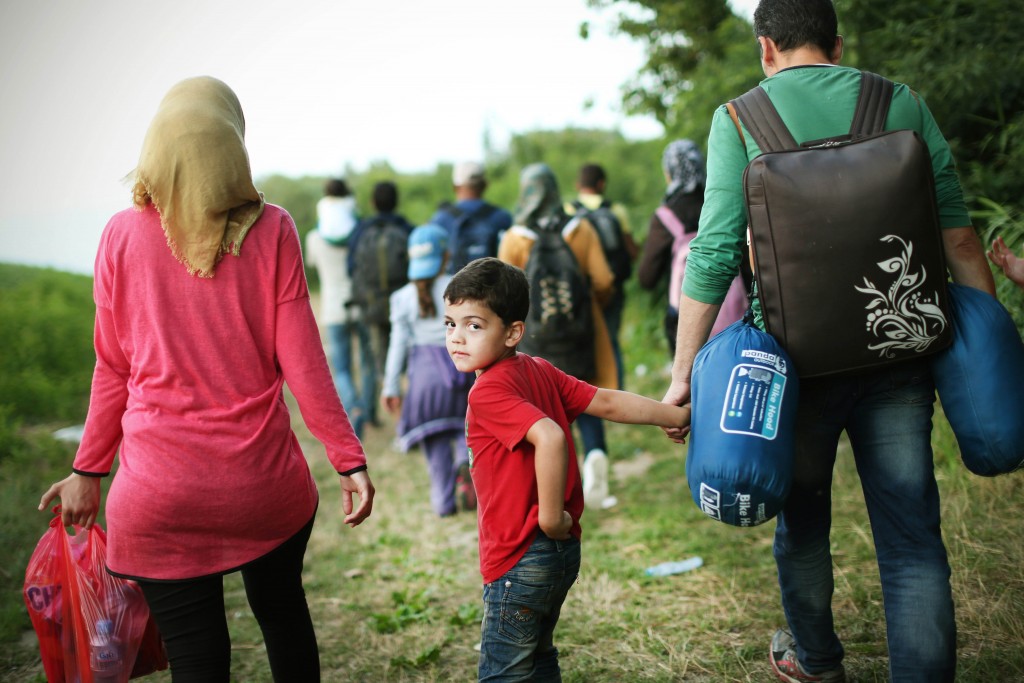
Thursday 6 August 2015
By the side of the road leading from the small town of Kanjiža in northern Serbia to the Hungarian border, a large band of 40 or so Syrian refugees – women, children, young men, an elder – had just sat down to rest. It was early on a Tuesday evening, and the group was finally getting some respite from the sun. They were plucking not quite ripe plums from a nearby tree and checking their mobile phones on which they had stored the directions for the fastest and safest route to the border.
This was, of course, only one of the numerous groups making their final bid to penetrate the fortress of the European Union. On the flatlands by the oily and quiet Tisa river where we joined the marchers, life was unfolding according to its ancient, decidedly slow rhythms. Most of the residents have long become accustomed to the endless procession of human suffering. In the last few months, Serbia has been turned into yet another waystation for a human tragedy mere language can hardly describe. It is no exaggeration to say this tragedy is sure to become one of the definitive humanitarian stories of the 21st century.
Horrible, just horrible
A few kilometres away from the border, a man in the group started to speak: “If all goes well, we'll be there in two and a half hours… We've been travelling for weeks, some of us for months.”
His name, he told us, was Rami. He was 27 and hailed from the northwestern Syrian city of Raqa, the capital of the self-proclaimed caliphate and the Islamic State (ISIS). He fled the city soon after it was captured by the members of the radical Sunni militia. He claims he had no choice. He had received word his name had been put on their death list. During the initial months of the Syrian conflict, he had been working as a journalist and had decided to help out one of his American colleagues. He had even been issued a press card by a prominent international newspapers.
This was not something ISIS was likely to forgive.
“It made no difference that I come from one of Raqa's strongest families. If I were to stay, they would have certainly killed me, no questions asked. The worst of it was that my own cousins were out to get me too,” Rami reflected, as we trudged on along the dusty local thoroughfare. “Almost all of them had joined ISIS. Almost everyone in Raqa had gone over to them, that is why they're so strong… Raqa will always be their territory. And so there was no one who could protect me.”
Rami's first destination was Turkey, where he had to stay longer than he originally planned since he got robbed in Istanbul. It took him a long time to earn enough money to continue on his journey. As soon as he was able to, he set off for the Turkish coast. In the meantime, he learned that his father had been killed, while his brother, who also refused to join the Islamic State, had been severely wounded while fighting the Syrian government forces.
In the Turkish port of Bodrum, one of the region's hubs for human trafficking, Rami met the other members of the group he was currently travelling with. That was two months ago. Since then, they have not once parted company.
As we walked on, Ali, 28, joined our conversation. He was a civil engineer from Azaz, a town near the Syrian-Turkish border which has seen heavy fighting between various insurgent groups, after being almost completely razed by government bombers. “In Turkey,the traffickers robbed us on two different occasions, and we also got a lot of trouble from the police,” he told us. “We sailed to the Greek island of Kos in a rubber dinghy. The boat was really small, but somehow everyone you see here managed to fit. It seems incredible that we survived. At least half of these people don't know how to swim. If the boat had capsized, we would all have died. It was horrible, just horrible!”
A modern-day odyssey
After arriving at Kos, where the recent heavy influx of refugees has plunged the island into chaos, the band of Syrians took a ferry to Athens. Every day, hundreds of refugees and immigrants enter the Greek capital. The Greek authorities, bogged down on countless other domestic and foreign fronts, had virtually stopped dealing with the problem. Their solution was simply to leave the door wide open. It was little wonder that the flood of refugees immediately headed for the Macedonian and Bulgarian borders. A new route to the European Union soon gained prominence, starting in Macedonia and leading through Serbia all the way up to Hungary.
Three weeks ago, Hungary started building a wall measuring 175km in length. Its basic objective is to put a stop to the influx of refugees and immigrants. Yet so far the Hungarians haven't been very successful at it. In the days we spent on both sides of the border, the situation was quite the contrary. The commencement of the immense construction project has only speeded up the current rate of migration, especially through Macedonia and Serbia, where the authorities understand very well what the erection of such a wall could mean.
In reality, the wall is not so much an actual obstacle for the incoming refugees as it is a clear political statement by the far-right government of Viktor Orbán.
“We made quite a large part of our journey through Greece and Macedonia on foot. It was horrible – it was hot, and we were all so hungry and thirsty… The people there refused to have anything to do with us,” Ali recalled in an effable tone, as if he were describing, say, a lovely view of the sea. “Somewhere in Macedonia, where we were generally treated very badly by the police, they herded us on to some buses which took us to the Serbian border. The entire region was full of refugees.”
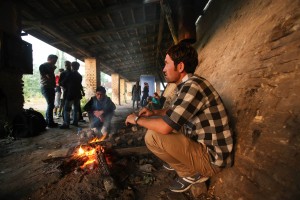
After a few more days trek, they reached Belgrade. “We all slept in the park. Belgrade, too, is flooded with refugees. But for us, that was actually a good thing, since we managed to get all the information we needed on how to safely cross the Hungarian border,” Ali continued.
In Belgrade, our band of refugees learned there were several viable options for reaching Hungary. The first option was a so-called ‘unaided' journey, meaning travelling by themselves. The route itself was clearly defined and there was plenty of useful information on how to maximize one's chances. But since the situation at the border was so unpredictable, this was considered to be the riskiest choice. The alternative was to entrust one's fate to the professionals, the human traffickers organizing the trip from the cities of northern Vojvodina (like Subotica, Kanjiža, Horgoš) to Hungary and then onward to Austria and Germany. One could even take a taxi from the Hungarian border directly to Vienna, which, according to our sources, would set one back €400. The entire package deal for getting from Serbia to Austria costs somewhere in the neighborhood of €1,500. For the Syrian refugees, the cost of all available options is about three times higher than for the rest. Traffickers consider them to be much wealthier than, for example, Afghans.
To really grasp their predicament, one needs to keep in mind that they are always facing a very real possibility of getting arrested, and that many of them have already spent most of their savings in order to reach Serbia. A large number of them got mugged, either by local criminals, their fellow refugees or even by the police. Unfortunately, there doesn't seem to be a great deal of solidarity between different groups of refugees – say between the Syrian and Afghan ones. Sadly, it is quite the contrary.
In Serbia and the wider region, the trafficking sector of the local economy has undergone a considerable boom. The basic set-up is simple, the profits are huge, and the risk is almost non-existent. This is especially so if the traffickers have done their homework and made proper arrangements with the police and the authorities, who are openly aiding refugees in crossing and leaving Serbia as swiftly as possible.
Once you get out in the field and see how things work, it could hardly be more obvious which way the wind blows.
“In Germany, they're sure to help us”
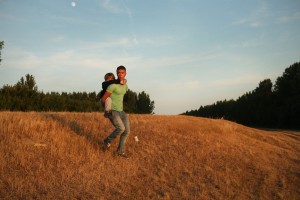
Right after the war started, Ali lost his job in a privately owned company, yet he decided to stick it out in Azaz. In the summer of 2012, the Free Syrian Army gained control of the city for a while, then the Islamic extremists took over. In a flash, the dream of the Syrian revolution became but a tragic memory. What started out as an insurgency against the ruling regime degenerated into a brutal civil war. Countless people started fleeing the devastated country.
“I'm glad that I'm not married and that I don't have any children. It is so much easier for me this way,” he explained, reflected a common sentiment among young refugees, as we proceeded towards the small Vojvodinian village of Mortanoš, the last notable settlement before the Hungarian border. “Most members of my family had fled to Turkey and decided to stay there. I, on the other hand, am young and I've had a good education. I'm going to do everything I can to get a job so I can take care of my parents.”
Where? “I want to go to Germany… In Germany, they're sure to take us in and help us – after all, we're refugees, we come from Syria,” he said, with perhaps unfounded optimism.
Like most members of this tattered little group, Ali was growing increasingly cheerful with every step closer to the border. As we entered Mortanoš, the entire group decided to rest. The women sat down on the grass, the children were visibly tired. The men took to discussing the optimal route for this final phase of the Serbian crossing. The local plum trees were quickly being relieved of fruit; it was getting darker by the minute. The refugees knew very well they were approaching the critical part of the journey. Only a little more than 4km were now separating them from the European Union. A gentle breeze picked up over the Pannonian plains.
“What can we do? Like everyone everywhere, we only have one wish. To live in peace. To be safe. Look how lovely this place is. It is so peaceful and quiet. There are fruit trees everywhere,” described Rami enthusiastically. “The people leave us alone, and there is plenty of water. I could certainly live here. You know, right now this seems like a paradise from my dreams.” It was obvious that Rami was getting a little carried away, but how could anyone blame him? With every kilometer, he was becoming less of an attention-starved showman and more of an excited little boy.
Basic human decency
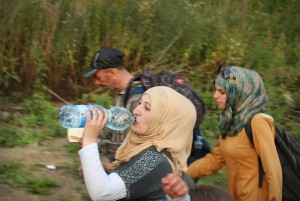
At the village's outer edge, the refugees were approached by a merry-looking elderly fellow, who offered them water from the hose in his garage. The Syrians were visibly confused. As the village dogs' barking approached a crescendo, they kept exchanging glances. The last few years have made them forget what basic human decency felt like. For them, it had become the exception that proved the rule.
After a few moments, one of the refugees handed out an empty plastic bottle to the old Serbian. Then the others slowly followed suit. Bashful yet profoundly grateful smiles were spreading over their faces as the older man used one hand to pour the water and the other to shoo away the mosquitoes.
“You need to follow the river,” the hospitable local told them in place of a goodbye. “But not up on the banks, you need to go as low down as possible, otherwise the police can spot you. But I haven't seen them here today…. Here, take some more plums.”
“But you need to be very careful, okay? Good luck to you,” the old man added in parting.
It is very easy to lose one's faith in humanity. It is infinitely harder to regain it.
As we pushed on, a hush fell over the group. The closer we got to the border, the more the refugees were instinctively huddling together. One of the marching men took hold of his three-year-old daughter and put her on his shoulders. The group's one elderly man was getting noticeably short of breath but – with the help of a sturdy wooden stick – he somehow still managed to keep pace with the rest. One of the refugees took out a tattered copy of the Quran and started to pray. The sun was slowly setting far away on the horizon. To our right, we could see a stretch of dense boggy forest and the Tisa river. To our left, there was haystack-strewn grassland, a few distant hamlets and the road leading to the official border crossings and further on toward Subotica. The evening light was growing softer as we trekked on to the soundtrack of dogs barking in the distance. Every now and then, we could see a stork touch down in a nearby field. For this particular band of migrants, these were all scenes of Xanadu-like tranquility. A perfect illusion.
“To be honest, I have no idea where we are. I hope we're on the right track. We really need to hurry. We have to reach Hungary tonight. Once we get across the border we need to avoid being caught by the police. If that happens, we could lose a few weeks,” Rami pointed, his voice growing ever more quiet. “Our group would get broken up, and we also need to avoid getting fingerprinted. That would mean that, even when we reach Germany, they could simply send us back to Hungary at any time. No one here wants to stay in Hungary. Personally, I would much rather stay in Serbia because the people were nicest to us there. Everywhere else we were treated like criminals.”
In Europe, he told me, he is eager to get work – any sort of work at all, as long as it would help him live in peace and safety. Ali, the blue-eyed engineer, felt exactly the same way. Both of them had had their share of the savagery of war. All they wanted was for the people of their new homeland to show a little understanding.
The members of the group weren't entirely clear on where they needed to veer off into the forest to avoid getting caught by the police. The border itself was rather poorly marked – in some places, there were no noticeable markings at all. And so the group decided to simply follow the tracks left by their predecessors. A trail of discarded objects led them onward. And at the precise moment when their doubts about having chosen the right path were turning critical, two local cyclists drove by down the nearby embankment. Opening their backpacks, the two men distributed a number of plastic water bottles “for the children” and relayed the vital information that the border was now only a 10-minute walk away.
“Simply follow the river all the way. We haven't seen a single policeman,” one of the cyclists said to encourage them before their imminent ordeal.
Hungarian border patrol
We moved on. In the distance, we could already see the ramp marking the border area where movement is strictly prohibited. Heavy dusk was falling over us, bringing anxiety to the faces of the advancing refugees. The mosquitoes were now out in full force. The women conferred among themselves and decided to make the children put on an additional layer of clothing. The men – many of them had fled their country to another continent with only a small sporty knapsack on their shoulder – were putting the final touches to the group's strategy. Many of their phones were starting to malfunction.
We crossed the dark Serbian-Hungarian border in complete silence. Only a few steps past the first Hungarian boundary stone the group came to a halt.
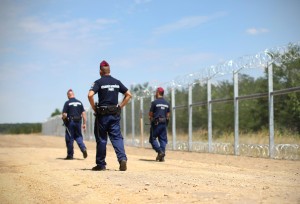
Rami put down his backpack and carefully set out on a reconnaissance mission – some hundred meters ahead, he detected a border patrol. He could identify one car and four policemen interrogating a small group of refugees. Two portable toilets were standing next to the police vehicle like some sort of mirage. Business as usual? It was clear that the mere four Hungarian policemen would be unable to stop our group of refugees. We had heard that the border guards often turn a blind eye. Despite the fact that the government had undertaken the huge anti-humanitarian project of putting up the wall, the Hungarian policemen are mostly treating the refugees with fairness and even respect.
But this was, of course, not something the group could definitively rely on. The moment of truth was fast approaching. Anxiety and even plain fear were returning to the refugees' faces. They had long learned that the combination of borders and uniforms can mean the difference between life and death for them. The anxiety and terror on their faces was thus a matter of pure reflexes, and in such situations, reason is always trailing far behind. The night had fallen, but the moon was mercilessly illuminating the exhausted faces. The refugees quickly slipped into the nearby forest, from which one could hear clear signs of life. As you would expect, our group of refugees wasn't the only one preparing for the final push into the heart of Europe. We were now on Hungarian soil. All the refugees needed to do to complete this crucial stage on their long journey was to evade the patrol. The children ate a few cookies and plums from their mothers' backpacks. The rest drank some water. They were all waiting for Rami's sign.
We bade them farewell.



Although even Germany and Sweden could do more for the absorption of refugees, we can be proud of these two European nations. One can only be ashamed of most other EU affluent countries, like the UK, France, Poland, Hungary and others who refuse point blank to accept any refugees. This is simply a disgrace!!!!